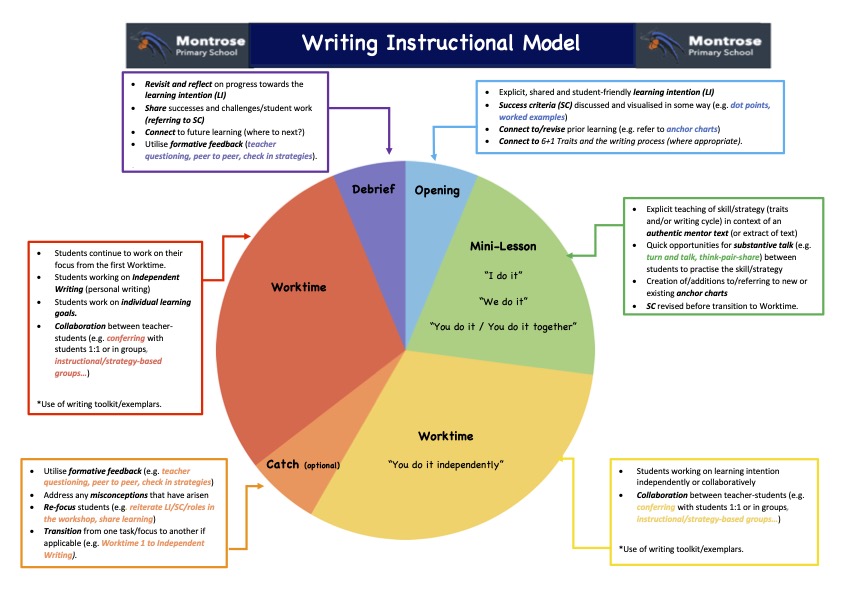Literacy
At Montrose Primary School, students are immersed in reading and a love of reading is promoted from Foundation through to Year 6. Students are taught that understanding and thinking about what they read is important.
Prep-Grade 2 - InitiaLit
All students from Foundation to Grade 2, are provided with daily reading, writing and spelling instruction in the form of InitiaLit. InitiaLit is an evidence-based, structured, whole-class literacy program, which provides all children with the essential core knowledge and strong foundations to become successful readers and writers. Although much of the focus of InitiaLit is on phonics, it also includes a Storybook component, where students are exposed to high quality literature to develop their vocabulary, listening and reading comprehension skills.
Prep
Implemented across four terms, InitiaLit–Foundation (InitiaLit–F) offers an explicit and effective model for teaching reading and related skills to children in their first year of school in a fun and engaging way.
InitiaLit–F focuses on two main components:
- Phonics, to systematically and explicitly teach the basic alphabetic code in a set sequence. In addition to learning letter-sound correspondences and how these are applied to reading and spelling, children will be introduced to common morphemes and simple grammatical concepts.
- Vocabulary, oral language and listening comprehension through quality children’s literature. Detailed lessons, including writing tasks, are provided for each of the storybook titles selected for use with the program.
Grade 1
InitiaLit–1 continues on from InitiaLit–Foundation in providing an explicit and effective model for teaching reading, spelling and related skills to children in their second year of school. As in InitiaLit–F, InitiaLit–1 focuses on the two main components of:
- Phonics, to systematically and explicitly teach the basic and advanced alphabetic code in a set sequence. In addition to learning letter-sound correspondences and how these are applied to reading and spelling, children will be introduced to common morphemes and simple grammatical concepts.
- Vocabulary, oral language and listening comprehension through quality children’s literature. Detailed lessons, including writing tasks, are provided for each of the storybook titles selected for use with the program.
Grade 2
By Grade 2, most children will be well on their way to reading independence. The program builds on the skills taught in InitiaLit–F and InitiaLit–1, with the focus shifting now to consolidating children’s reading and spelling skills, working specifically on reading comprehension, fluency, spelling and vocabulary.
InitiaLit–2 has four main components:
- Spelling. This component reviews phoneme-grapheme correspondences and spelling concepts taught in InitiaLit–1 and teaches the remainder of the advanced alphabetic code systematically and explicitly. Children will also learn new spelling rules and morphological concepts.
- Reading comprehension and fluency. In this component, children will be taught comprehension strategies explicitly and how to apply them to different types of text. They will also be given regular opportunities to work on reading fluency through echo, choral and paired reading.
- Grammar. Children will be explicitly taught key grammatical features and how to apply them to a writing task.
- Vocabulary, oral language and comprehension through children’s literature. Detailed lessons are provided for each of the 15 storybook titles selected for use with the program, including detailed writing tasks. Two novel studies are included for use towards the end of the year.
Grades 3-6 - Readers' and Writers' Workshop
From Grades 3-6, all classroom teachers utilise the Workshop Model to teach reading and writing. The Workshop Model is a research-based approach that is used widely in high performing schools, enabling teachers to implement many of the teaching strategies that categorise high quality teaching practice. Classroom teaching teams utilise high quality literature, in conjunction with frameworks like the 6+1 Traits, The Writing Process, and the F&P Systems of Strategic Actions, to develop students’ confidence and expertise in reading and writing across a range of text types. Spelling and grammar are also taught within the context of high-quality mentor texts.




© Copyright Montrose Primary School
